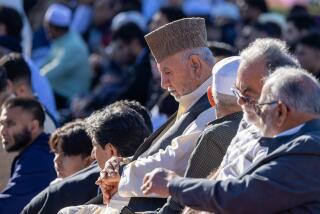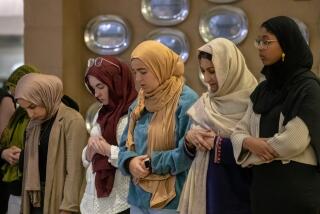Ramadan: Prime time for TV
- Share via
CAIRO — It is a season of egos, high-priced commercials, historical epics, strange comedies and prickly off-camera dramas involving Iranian makeup artists, Syrian directors and Egyptian movie stars.
Ramadan may be a month of prayer, fasting and virtue in the Muslim world, but it is a less than holy time on TV. Satellite channels and studios compete for viewers and advertising dollars as box office legends are rolled out for long-winded docudramas and thrillers that play like “The Bold and the Beautiful” amid minarets and desert landscapes.
Audiences across the Middle East are an easy target. After breaking their fasts at sunset, families relax in front of the TV, with seasonal serials about the famous, the cunning, the funny and, increasingly, the dull. For 30 Ramadan nights, the ritual for millions of Muslims is food, prayer and remote.
“In the 1970s and ‘80s, there were only two channels that carried Ramadan shows, but the quality was good,” said Sherif Awad, a film critic. “Today, with hundreds of satellite channels selling hours of advertising, viewers are getting lost. Production companies and scriptwriters are repeating themselves. The Ramadan shows are losing their essence. There’s nothing new. Everything is predictable.”
Originality is scarce to begin with in a TV market run by princes and politically connected executives and driven by about 300 channels from Tunis to Cairo to Dubai. But no time of year is more important. During Ramadan, which is pegged to lunar cycles and this year is expected to end Sept. 30, TV channels earn as much as 35% of their annual advertising revenue.
Advertisers are demanding more commercial time to woo an expanding middle class that is largely apolitical and materialistic. Mohamed Shaaban, owner of the King Tut production company in Egypt, said that a few years ago a 30-episode drama would have six hours of commercials. This year, his Ramadan serial “Sharaf Fateh El Bab,” the tale of a corrupt civil servant, is expected to carry 10 hours of ads.
“From an artistic viewpoint, such interruption affects the drama, but we cannot control it,” Shaaban said. The rate of economic growth in the region “has witnessed a leap,” he said. “The food and heavy industries have developed and we can see this in the ads. . . . The viewership is extremely high during the month of Ramadan.”
An Egyptian-produced serial that runs for the month can cost more than $5 million. Much of that goes to sign stars whose Ramadan salaries in the last three years have jumped as much as 300%. Advertisers look for actors such as Nour El-Sherif, who plays a ruthless businessman in “El Dali,” and Yosra, a movie star who poses as a journalist exposing child smuggling rings in the serial “In Safe Hands.”
“Egyptians like to shoot these shows in a hurry,” Awad said. “You might have one star shooting five roles in different productions at the same time. Here he’s poor. Here he’s rich. He has a mustache here. He doesn’t have one there. He wears a galabeya (floor-length tunic) in this role and a suit jacket in the other. The audience gets confused.”
The satellite TV boom that began in the late 1990s opened the Middle East to a growing grid of channels and Western imports such as “Friends” and MTV. It also spawned regionalization. Shows from Syria, Lebanon and the Persian Gulf were exported across the Muslim world. Suddenly, dialects and cultures were mixing amid competition and changing story lines in a blending of cultural, if not political, creativity.
One of this year’s most anticipated Ramadan bio-pics is about legendary Lebanese singer Asmahan. It is directed by a Tunisian, co-written by a Syrian and an Egyptian, and stars Syrian, Lebanese and Egyptians actors. A politically sensitive serial on former Egyptian President Gamal Abdel Nasser was directed by a Syrian with makeup done by Iranians, much to the dismay of Egyptian makeup artists.
Unfolding plots and sub-plots can be numbing and unmoving. Audiences and critics complain of stale narratives and are increasingly searching for sophisticated productions. This has opened the Egyptian market to Syrian production houses and actors, who are well-trained yet work for less than their Cairo counterparts. A popular show airing here is a Syrian import, “The Alleys Gate,” a saga set in the 19th century that follows the people living in a city alley.
“In the future, nationalities will be irrelevant,” said Tarek El-Shenawy, one of Egypt’s leading film and TV critics. “We won’t classify works in terms of being Syrian or Egyptian. A convergence of nationalities is taking place thanks to the satellite media.”
Nationalities and tribes, however, still hold sway in less democratic nations. The United Arab Emirates canceled a Ramadan series, “Saadoun al-Awaii,” based on an 18th century tribal leader and poet. Reports said the show was pulled when the Saudi government intervened on behalf several Saudi tribes that complained they were unfairly portrayed.
It is perceived immorality in shows and commercials, rather than historical interpretation, that angers conservative clerics. A leading Saudi Islamist jurist recently sent a scare through the media establishment when he sanctioned the killing of TV executives he blamed for peddling indecency. Most Ramadan serials avoid such condemnation, earning their profits by trying to appeal to both the pious and the secular in several countries.
“The rules of the market dictate that you sell the show to two satellite channels; one Egyptian and another one from the gulf,” said Gamal El-Adl, executive director of the El-Adl production group. “This does not cause any competition between the two over ads because the Egyptian advertising market is different from the gulf one. . . . The show is like a house that you rent and that keeps generating income for you.”
Film critic Awad remembers nine years ago when a Ramadan series on the life of the Egyptian diva Umm Kulthum riveted the region. It was a clever blend of a towering personality brought to the small screen, yet writ large.
“This quality of show,” he said, “is rarely made today.”
--
jeffrey.fleishman @latimes.com
Noha El-Hennawy of The Times’ Cairo Bureau contributed to this report.
More to Read
Sign up for Essential California
The most important California stories and recommendations in your inbox every morning.
You may occasionally receive promotional content from the Los Angeles Times.











